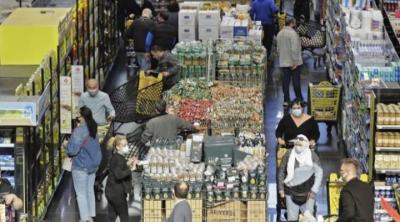Like most sectors in Lebanon that have moved towards "dollarization" of their prices, supermarkets will begin implementing pricing in dollars starting tomorrow (Monday). The Ministry of Economy is set to announce the new mechanism to be followed, with the most important aspect being the announcement of the exchange rate applied at the entrance of the supermarkets, as stated by Minister of Economy Amin Salam. He announced that on Monday a clear mechanism for dollar pricing will be established, "and based on that, we will force supermarkets to display the exchange rate at their entrances every day."
While the focus is on how this decision will be implemented amid the chaos plaguing various sectors in the Lebanese markets, Hani Bahsali, head of the Food Importers Syndicate, believes that "the positives of this step outweigh the negatives, as pricing food items in dollars benefits the consumer." In an interview with "Asharq Al-Awsat," he pointed out that "this measure ends the statement that prices rose because the dollar’s exchange rate increased, while prices didn’t drop when the exchange rate decreased," highlighting the rapid and unexpected fluctuations in the exchange rate that the central bank has been unable to control.
He clarified about the mechanism to be followed: "Consumers have the freedom to choose to pay in dollars or in Lebanese pounds, and when the price is unified in dollars, citizens can monitor prices then." He emphasized that "the consumer benefits from dollar pricing more than the negatives," noting that "the invoice will be in Lebanese pounds, but the prices on the shelves will be in dollars. The exchange rate will also be clear," according to the black market pricing.
Regarding the legality of this step, Bahsali stated, "Parliamentary committees conducted a legal study and reviewed (the Consumer Protection Law, the Currency and Credit Law, the Penal Code, among others). According to the legal opinion reached under item five of the Consumer Protection Law, there is no legal violation if pricing is done in dollars, but a violation occurs if consumers are forced to pay in dollars." He concluded by confirming that "prices will decrease later on; we have moved to a trial phase that should have regulations, and this is a positive experiment, not a negative one."
In the same context, Nabil Fahd, head of Supermarket Owners Syndicate in Lebanon, told "Asharq Al-Awsat": "Since it is challenging for retail points of sale to price their goods transparently to reflect their true costs, pricing in a stable currency like the dollar benefits the consumer first and the economy and commercial sectors."
When asked about implementing dollar pricing amid the economic and living crisis and the limited income of most families, Fahd listed the benefits, indicating that it enables the Ministry of Economy and the Consumer Protection Directorate to monitor prices effectively and promotes competition among different supermarkets, as consumers can compare prices in a fixed currency and choose the lowest price point. He also noted the possibility of price reductions due to merchants not needing to increase the exchange rate, as a need for protection against fluctuations in the dollar price in the parallel market.
He considered that with this decision, "prices at selling points become stable, and announcing them through shelf labels becomes easier, avoiding sharp fluctuations in goods prices, allowing citizens to know the price of goods as before." He explained the mechanism for implementing dollar pricing and Lebanese pound payments, confirming that it is "easy to implement and clear, as the approved exchange rate is displayed at the supermarket entrance and at cash registers to make the price clear to consumers."
He added: "The invoice provided to consumers by supermarkets must include the total purchases in Lebanese pounds, the value-added tax in Lebanese pounds, and the approved exchange rate, in addition to the obligation to accept the receipt in Lebanese pounds but giving consumers the option to pay in any other way."
Concerning monitoring and regulating dollar pricing, economic expert Walid Abu Suleiman told "Asharq Al-Awsat" that the only way to regulate this if payment is in Lebanese pounds is to issue a daily average exchange rate that supermarkets rely on, similar to what happens with fuel and medicine prices, while emphasizing the necessity of verifying the data of commercial establishments amid the lack of transparency and a central platform for all sectors.
Despite discussions of the positives of this move by traders, the Consumer Protection Association warned that "dollarization will only benefit traders, just as they profited from the support exceeding 25 billion dollars three years ago, and it will further exacerbate inflation and the collapse of the lira." The association previously warned of "the danger of adopting dollarization in all sectors, especially fruit and vegetable prices, which are still within the reach of the poor, as they are locally produced and constitute the basis of a nutritious Lebanese diet; dollarization will lead to the control of commercial mafias over them, threatening the health of the poor significantly."




